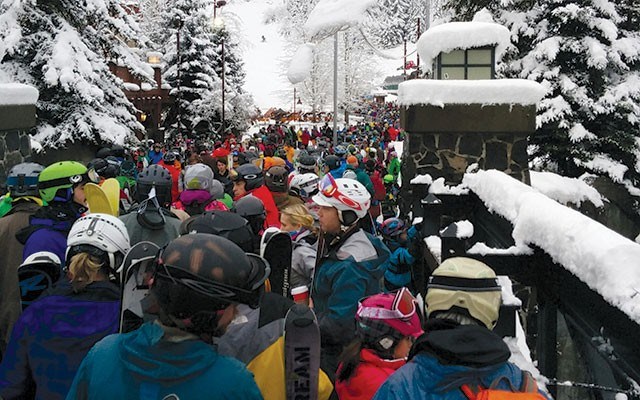Mild muscular protest in the lower third of my body. Whoa — what the hell are we doing? From Command and Control, an instantaneous unconscious response: Don't worry, nothing new. Just relax. By the third turn I'm skiing, a smile creasing my face. Great conditions. A sunny day. Body memory driving the bus. A 10-month gap closed in an instant, the only evidence of time's recent passage subtleties otherwise attributable to a winter spent here and not abroad: a tanned face, an unkempt beard, an empty wallet.
Coming home after a long trip is always interesting. Reactions are manifest and varied, whether you're well-travelled or not, and highly dependent on a suite of conditions: Why and when did you leave? How long were you gone? Where did you go? What is the nature of home anyway? This last figures more heavily these days, but let's leave it for a moment.
Re-entering the world of a decidedly high-brow, first-world destination after the often difficult experiences of four months traversing the physical and cultural underbelly of Southeast Asia was, according to those given to pronouncements, going to hit hard. Prepare for culture shock they warned. Based on past experiences, I was inclined to agree: once upon a time nine months in South America changed my view of the world and left me reeling; subsequently, a five-month stint in the South Pacific had reinforced a desire to pursue an academic path in life. Coming home this week — with Whistler's hibernal raison d'être still in full swing — there were, I reasoned, bound to be difficult adjustments. So be it; on the flight back, I'd mentally shrugged at the inevitability of some kind of cultural schism that would need to be bridged. Only it never came.
Instead of weird, everything felt immediately normal. Snow seemed welcome, winter mountains familiar, crowds acceptable. Friends not seen in many months felt like they'd only been out of sight a week. Within a day we'd reclaimed stored possessions, resumed conversations, reinstituted habits, visited our garden plot. The only odd thing was that none of this felt strange in any measure — not at all like the existential fogs I found myself submerged in after previous sojourns. Naturally, I'm given to wonder over the difference.
First, the obvious: I went to South America as a young man in his mid-20s who'd never been off the continent, naïve and conditioned to believe everything he was told. Travelling low to the ground in Chile, however, I'd quickly learned what really happened to democratically elected socialist president Salvador Allende, murdered in a U.S.-supported coup by a junta led by war criminal General Augusto Pinochet. I met people who'd miraculously escaped the infamous post-coup stadium executions, and teachers who'd been exiled to Patagonia, forced into a shadowy, feral existence. No wonder my head exploded upon return to the sanitized, parochial environs of Toronto where everyone I knew continued to live in blissful ignorance of such weighty concerns. Home briefly seemed a bizarre place out of touch with truths that could, it seemed, only be sourced on the ground. The rampant friendliness, openness, and low-tech inventiveness of daily life in developing nations also seemed sharply contra our silver-platter culture, to the extent it was difficult to re-enter.
So... was it now the case that in middle age, after years as an itinerant writer and, like most Whistlerites, inveterate traveller, that I was inured to such things? Unmoved and unsurprised by any discovery at odds with a received view? While this must certainly be true to some extent, it isn't the whole explanation. This is: no more cultural isolation.
Back in the day, when you left Canada on a long trip you left Canada — land, news, people. The only communication was via lengthy but infrequent air-mail missives. As recently as the late 1980s I had to line up at post offices in remote locales to make a long distance call home on the only phone available; sometimes it didn't even work. In those days you travelled in true isolation and quickly put aside the way things worked at home and learned to function in a new milieu. When you returned, the required shift was palpable.
No longer. To start, globalization has meant emulation and deep penetration of the same economic and pop culture waypoints around the planet, diluting the quotient of "foreign" encountered anywhere. Furthermore, hyper-connectivity in this Global Village and a daily dish of social media means not only unprecedented pre-information available on travel destinations, but that you're rarely in true isolation; your culture — your home — literally follows you abroad. Seeing familiar faces and landscapes on a daily basis means never completely disconnecting.
To answer my own question, I'd watched — no, lived — the entire Whistler winter on Instagram and Facebook. No wonder it wasn't hard to get back into skiing. I'd been making turns in my head every day.
Leslie Anthony is a Whistler-based author, editor, biologist and bon vivant who has never met a mountain he didn't like.




